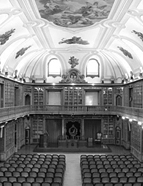

Until this point, innovation emerged in an isolated manner through younger professors and librarians such as Coelho da Rocha, Alexandre Herculano, Cunha Rivara, and others. The main exception was Francisco Adolfo de Varnhagen, supported by the vice-president of the Academy, Fr. Francisco de São Luís. For instance, it would not be the ACL to publish the first modern collection of documentary synopses and Portuguese diplomatic documents, the Quadro Elementar ... and the Corpo Diplomático ..., in 1842 and 1846, but rather the Portuguese government through the Viscount of Santarém in Paris. Likewise, it would be Heinrich Schaefer, Ferdinand Denis, and Alexandre Herculano who would publish histories of Portugal worthy of the name through private publishers in Hamburg, Paris, and Lisbon between 1836 and 1839 and again in 1846. Similarly, it was not the ACL that published historical texts on traditional Portuguese courts, national institutions, or recent political events, as was the case with works by the same Viscount of Santarém, Coelho da Rocha, and José Liberato Freire de Carvalho during the years 1827 to 1841. Furthermore, a lthough José Liberato did eventually become a full member of the class of moral sciences and fine arts (though he was not by the time of his death), neither Schaefer nor Coelho da Rocha became members of the association; Denis became a member only much later on, and Herculano even resigned as a corresponding member due to disagreements regarding the controversy around the miracle of Ourique.
Such examples, although isolated, appear to point to a consistent issue within the ACL during the period between 1834 and 1851: at that time, history was not a priority field for innovation and methodological renewal, as the country lacked the stability, funding, and drive needed to channel these resources into the institution. Portugal was out of step with the cultural priorities of other parliamentary monarchies in Europe. The works presented within the ACL continued to be characterised by the old sectoral analyses found in the Memórias de Literatura of 1792-1814. While the latter had been innovative at the time of their publication at the end of the 18th century, naturally they could not remain so forty or fifty years later. Even debates and publications on Portuguese literature—one of the Academy's primary objectives—had now fallen into the hands of literati and historians such as Ferdinand Denis, Francisco Adolfo de Varnhagen, and Alexandre Herculano, in books published in Paris and Lisbon, and in prestigious periodicals such as O Panorama and the Revista Universal Lisbonense .
